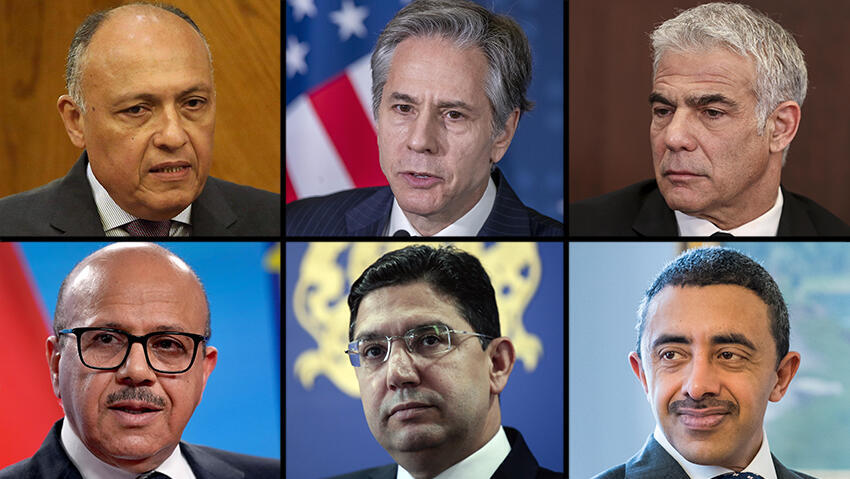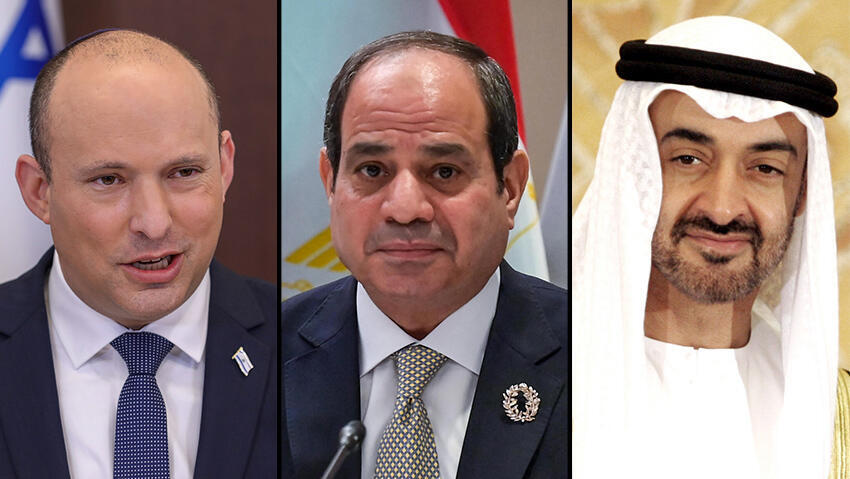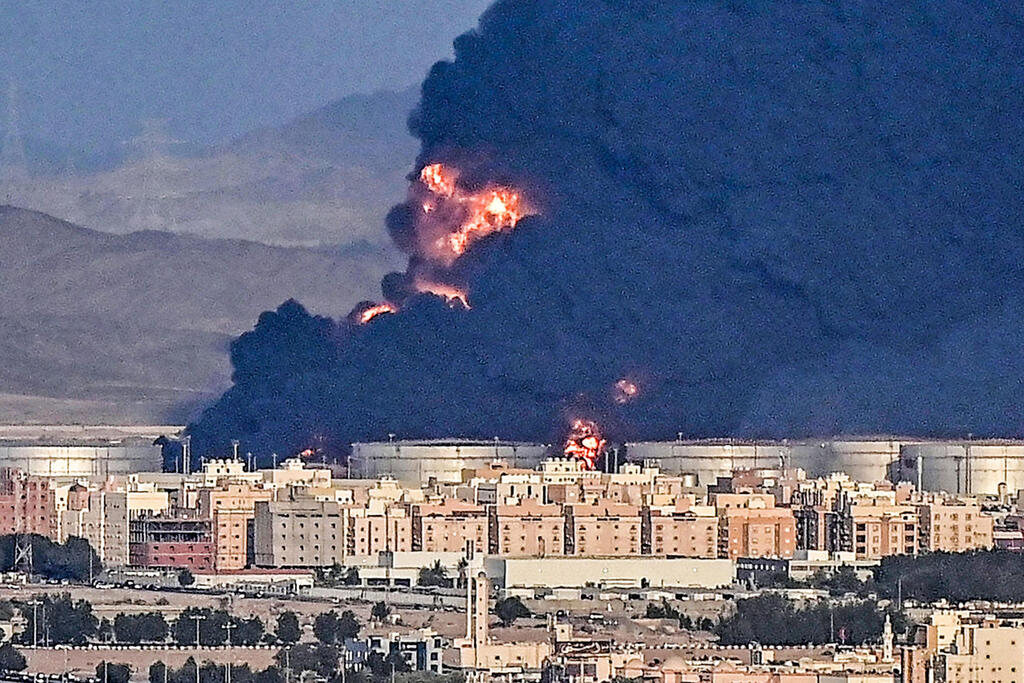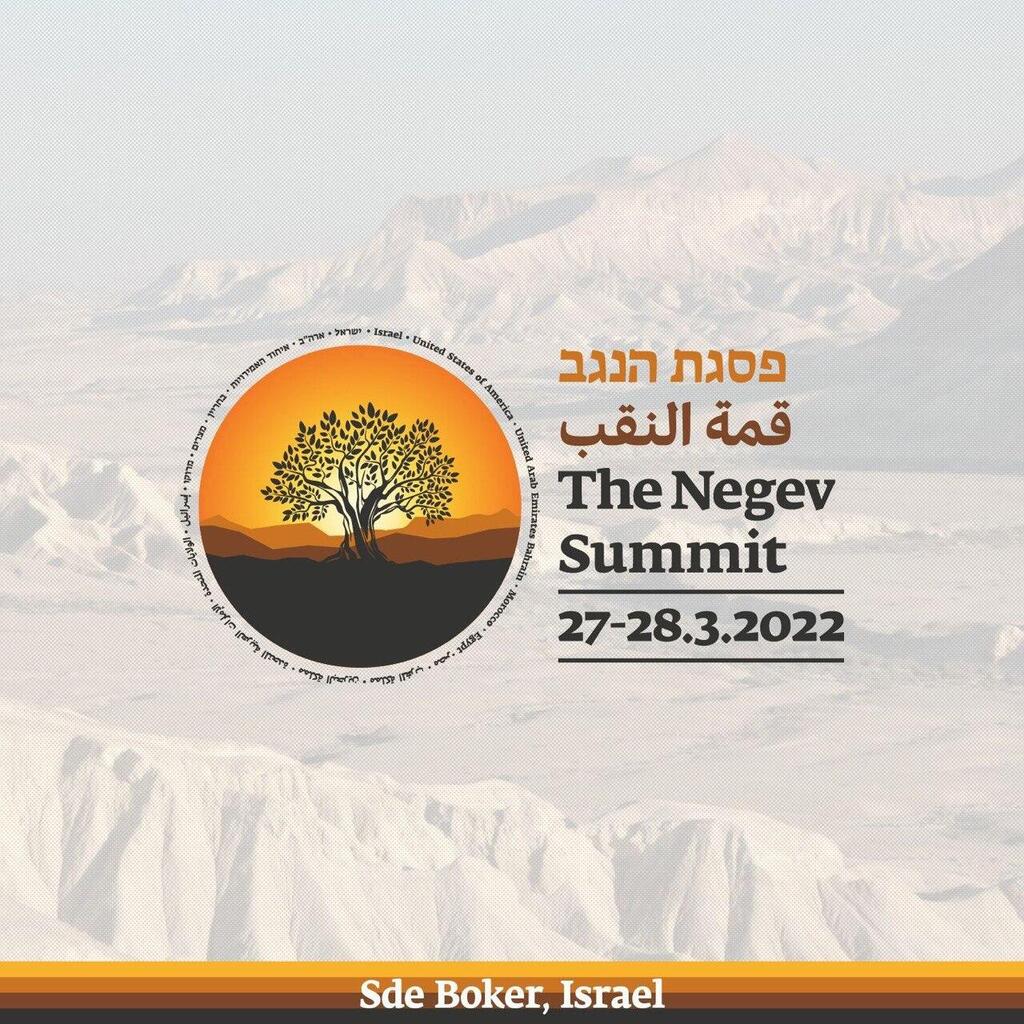Getting your Trinity Audio player ready...
A historic regional summit is set to kick off later on Sunday in Israel's south, with participation of representatives from the United States, United Arab Emirates, Bahrain, and Morocco. Threats posed by Iran's nuclear problem and its ramifications on the Middle Eastern security are set to be the main topics on the agenda.
The Negev Summit, set to be hosted in the remote Negev desert farm collective Sde Boker, comes after a series of political developments in the region over the past two years, which helped solidify Israel as an important political player in the Middle East.
4 View gallery


Clockwise: U.S. secretary of state, Lapid, UAE foreign minister, Moroccan foreign minister, Bahrain foreign minister, and Egyptian foreign minister
(Photo: Reuters, AP, AFP)
Of these important developments, some occurred in the past few weeks: President Isaac Herzog's visit in Turkey after more than a decade of stagnation in ties, the meeting of Prime Minister Naftali Bennett last week in Sharm al-Sheikh with leaders of Egypt and the UAE, and the strengthening of security cooperation with Morocco.
All of these mark the geopolitical development of the Jewish state, especially in the Middle East. However, Israel's main concern remains the potential renewal of the nuclear agreement with Iran as well as fears of security escalation in the face of the start of the holy month of Ramadan on April 2.
Bennett appears to have been able to fill the political shoes left by his predecessor, Benjamin Netanyahu, who laid the groundwork for these recent developments – with the Abraham Accords signed during his tenure - initiated by the American administration and former U.S. President Donald Trump.
4 View gallery


Prime Minister Naftali Bennett, Egypt's President Abdel Fattah al-Sisi and Abu Dhabi Crown Prince Sheikh Mohammed bin Zayed al-Nahyan
(Photo: AP, AFP, Mark Israel Salem)
The prime minister's meeting in Egypt only emphasized Israel's warming relations with the Arab countries. At the meeting, the three leaders discussed the stability of energy markets, food security, and technological developments.
Egypt faces new economic pressures due to the war in Ukraine, and Bennett hopes to seize the opportunity and offer the Egyptians a deal that would see the Israeli gas undergo a refinery process in Egypt and then shipped to Europe.
The Iranian nuclear threat was also brought up in last week's Egyptian summit, as the Vienna talks to revive the agreement enter their final stage. Both Israel and the Sunni Arab countries share the concern regarding potential consequences of reviving such a deal.
4 View gallery


The latest attack in Saudi Arabia carried out by Iran-backed Houthi rebels
(Photo: AFP)
In an attempt to leverage the shared concern about Iran, Bennett on Saturday issued a condemnation of Houthi rebels' attack on Saudi Arabian targets, even though the country is not part of the Abraham Accords. The unofficial relations between the two states have undoubtedly tightened, with the Sunni state now allowing flights from Israel to pass over its territory.
“The State of Israel expresses its sorrow to the Kingdom of Saudi Arabia after the horrific attack by the Iranian-backed Houthis,” said Bennett in the statement. “The attack is further proof that Iran’s regional aggression knows no bounds and reinforces the concern of Iran’s IRGC being removed from the FTO list.”
An Israeli official said on Saturday that “the purpose of the Negev Summit is a different Middle East.”
"Israel never hosted a summit of this kind, in which four Arab foreign ministers attend to.” The official added the concerns over the revival of the Iranian deal is on the agenda, even though the U.S. Secretary of State will be present. "All the participating countries share the same Iranian threat," he said.
Unlike the Netanyahu era, the current Israeli approach doesn't include a clear propaganda campaign against the nuclear agreement and mainly focuses on an aggressive campaign of procurement of security equipment - with the understanding that Israel can't trust anyone but itself.
Another shared issue is the removal of the Islamic Revolutionary Guard Corps (IRGC) from the terror list by the U.S.
The United States is prepared to remove the IRGC from its notorious list and demands an amorphous exchange in the form of a commitment by the Iranians to "restrain" the organization. Israel and its new regional allies are having trouble accepting such a move.
Although recent events place Israel in a great position in the region for the upcoming summit, there are growing concerns about the upcoming Ramadan, which could potentially spark a fresh round of Palestinian violence and undermine the political gains.
Therefore, the Israeli political leadership - while focusing on warming up relations with its Arab allies, and addressing the shared concern over Iran - must also keep an eye on the local Palestinian issue so that potential violence doesn't shatter its political aspirations.


